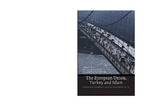The European Union, Turkey and Islam
| dc.contributor.author | Wetenschappelijke Raad voor het Regeringsbele, | |
| dc.contributor.editor | Netherlands Scientific Council for Government, | |
| dc.date.accessioned | 2010-12-31 23:55:55 | |
| dc.date.accessioned | 2019-12-10 14:46:32 | |
| dc.date.accessioned | 2020-04-01T15:34:24Z | |
| dc.date.available | 2020-04-01T15:34:24Z | |
| dc.date.issued | 2004 | |
| dc.identifier | 340213 | |
| dc.identifier | OCN: 437089601 | en_US |
| dc.identifier | 58532635 | en_US |
| dc.identifier.uri | http://library.oapen.org/handle/20.500.12657/35133 | |
| dc.description.abstract | Does the fact that the majority of Turkey's population is Muslim form a hindrance to its EU membership? According to a recent policy advice by the Netherlands Scientific Council for Government Policy (WRR), the answer is an adamant 'no'. Why is this issue of Turkish Islam relevant? After all, Turkey should not be judged by standards other than the Copenhagen criteria. The answer is that the public debate outside 'Brussels' will not be limited to these official criteria. Many people in Europe are worried about Turkey's 'Islam factor'. They believe that Muslims are (potentially violent) fundamentalists who want to establish a theocracy. By explicitly examining the role of Turkish Islam and Muslims in Turkey, the WRR wants to contribute to a well-informed European public debate on Turkey's accession. | |
| dc.language | English | |
| dc.relation.ispartofseries | WRR | |
| dc.subject.classification | thema EDItEUR::Q Philosophy and Religion::QR Religion and beliefs | en_US |
| dc.subject.classification | thema EDItEUR::J Society and Social Sciences::JH Sociology and anthropology | en_US |
| dc.subject.classification | thema EDItEUR::J Society and Social Sciences::JP Politics and government | en_US |
| dc.subject.other | public administration | |
| dc.subject.other | sociology | |
| dc.subject.other | bestuurskunde | |
| dc.subject.other | political science | |
| dc.subject.other | religie | |
| dc.subject.other | sociologie | |
| dc.subject.other | religion | |
| dc.subject.other | politicologie | |
| dc.title | The European Union, Turkey and Islam | |
| dc.type | book | |
| oapen.abstract.otherlanguage | Bij de vraag of Turkije lid kan worden van de Europese Unie speelt de islam officieel geen rol. Maar binnen en buiten de politiek vragen velen zich af of Turkije als moslimland wel past bij de Europese Unie. Kan de islam samengaan met democratie, mensenrechten en de scheiding van religie en staat? In dit rapport gaat de Wetenschappelijke Raad voor het Regeringsbeleid in op de plaats van religie in de Europese Unie en in Turkije. Het leerstuk van de scheiding van religie en staat vormt hiervan een belangrijk onderdeel. Naast het rapport bevat deze publicatie ook de verkenning van Erik-Jan Zürcher en Heleen van der Linden Zoeken naar de breuklijn, die onder meer ingaat op de houdbaarheid van het wijdverbreide beeld dat er een culturele en religieuze 'breuklijn' loopt tussen Turkije en Europa. Zij hebben deze studie speciaal voor het WRR-rapport geschreven. | |
| oapen.identifier.doi | 10.5117/9789053567128 | |
| oapen.relation.isPublishedBy | dd3d1a33-0ac2-4cfe-a101-355ae1bd857a | |
| oapen.relation.isbn | 9789053567128 | |
| oapen.pages | 176 | |
| oapen.identifier.ocn | 437089601 | |
| oapen.identifier.ocn | 58532635 |

